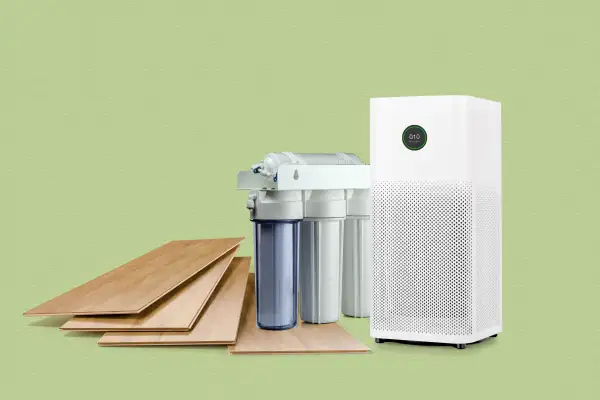From Touchless Faucets to CDC-Approved Air Filters, Here's How to Make Your Home 'Healthy'

Working out, eating fruits and veggies and drinking plenty of water are all great ways to improve your health. Another option? Updating your house.
It may sound far-fetched, but your home can actually have a huge impact on your well-being. Its HVAC system pumps out the air you breathe. Its pipes deliver the water you drink and cook with. Even its flooring and lighting can make a difference in the long run.
“We spend the vast majority of our lives in our homes,” says Joseph Allen, an associate professor at Harvard’s T.H. Chan School of Public Health and director of the school’s Healthy Buildings program. “It’s obvious from that alone that how we design and maintain our homes has a massive impact on our health.”
Historically, most people spent about two-thirds of their time at home. But with the pandemic — and the quarantining, remote work and social distancing it’s ushered in, many people are now there more than ever.
“The increased amount of time people spend at home — in tandem with increased awareness around health and well-being during the pandemic, has prompted people to explore how to make their homes healthier places to be,” says Jie Zhao, executive vice president at wellness technology company Delos. “More than ever, people want to invest in their health and well-being — and there's no better place to start than our homes.”
Want to be sure you’re spending the bulk of your days in a healthy environment too? Zhao and Allen say these are the home improvements to start with.
5 ways to invest in your health at home
Swap your basic air filters for MERV 13 ones
According to Zhao, who heads up Delos’ indoor health research arm, focusing on your home’s air quality should be priority No. 1.
“Better air quality is the most important feature,” says Zhao. “Poor air quality contributes to more disease burden than any other environmental risk factor.”
One of the best ways to start improving your home’s air quality is to swap out your HVAC filters with MERV 13-rated ones. These high-efficiency filters capture smaller airborne particles — things like viruses, mold, bacteria and allergens — than the lower-rated MERV 8s that are installed in most single-family homes.
“The typical filter that's in your HVAC system is designed to protect the equipment, not you,” Allen says. “It captures a really small percentage of airborne particles. A MERV 13 will get you to 80 to 90% capture efficiency.”
Both the CDC and the Environmental Protection Agency recommend MERV 13 filters or better. These typically cost around $40 to $60 for a multipack and need to be replaced at least every three months. Check your HVAC manual or consult a professional before installing.
Invest in air purifiers
Air purifiers are another way to improve air quality at home. This can mean installing a whole-house purification system, which costs anywhere from $500 to $4,000. If you rent or want a quicker fix, invest in smaller, portable air purifiers and place them throughout the house. If you opt for the latter, choose purifiers with HEPA filters. These weed out more than 99% of dust, pollen and other airborne particles and cost around $50 to $300 each.
“Portable air cleaners with HEPA filters are another great strategy,” Allen says. “When they're set right for the room, they provide you with four, five or six air changes per hour of clean air, so they're constantly filtering the air.”
Zhao also recommends buying an air quality monitor. These let you know what pollutants are in the air at your home, so you can open more windows or adjust your purification efforts accordingly. They may also help reduce your COVID-19 risk at home.
“By now we all know COVID-19 is mostly transmitted through aerosol particles, so ventilation with filtered outdoor air, operable windows, portable air purifiers and air quality monitors are all great solutions to help reduce the chances of getting and transmitting SARS-CoV-2 and other respiratory viruses,” Zhao says.
Air quality monitors typically run a few hundred dollars. Many are even app-controlled, so you can check on your home’s air quality on the go.
Get a water filter
Water quality is another important health factor to tackle — especially if you live in an old house.
“If you're in a home that was built in the ‘70s or earlier, there's a really good chance that your plumbing fixtures contain lead,” Allen says. “So you really want to be sure that the drink of water coming out of your tap is not contaminated with lead — a really nasty neurotoxin.”
There are a few options for filtering your water, including whole house filtration systems or smaller water filters at the tap or on your refrigerator. Whole house systems usually cost a few thousand dollars, while tap-attached filters (like Brita filters) are only around $30.
The main goal? Avoid drinking water straight from the tap if possible — especially if it’s high in contaminants (check the Environmental Working Group’s tap water database or your local utility district for details).
“Tap water may contain heavy metals, organic compounds and other pollutants that may be harmful — especially to children,” Zhao says. “Tap water also contains chlorine, which is added during the water treatment process at a municipal level. If chlorine levels are higher, it can lead to poor water taste, which could make you less likely to drink enough.”
Replace carpets with wood or tile
According to a Homes for Health Report penned by Allen and his team at Harvard, carpeting holds onto dirt, dust and chemicals, which are released into the air when you walk across it. Carpets can also breed mold and mildew — and subsequently, coughing, wheezing and upper respiratory tract problems too.
“Water alone doesn’t allow mold to grow — it also needs a food source,” the report notes. “Carpets can trap moisture, which when combined with embedded dust, produces mold and mildew.”
If you can afford it, replace carpets with wood or tile. If that’s not possible, invest in a HEPA vacuum and commit to vacuuming your carpets on a regular basis.
As the report explains, “Vacuums that don’t use HEPA filtration may simply be picking up dirt, breaking it up into a million smaller pieces, and then scattering it around your house. A HEPA filter will trap the dust particles before they can be released into the air.”
Set up a dehumidifier
Dehumidifiers can also help you fight off mold and mildew.
“Mold is commonly found in bathrooms, basements, kitchens and other spaces that have a lot of moisture and are poorly ventilated,” Zhao says. “It’s linked to various respiratory issues.”
Portable dehumidifiers cost anywhere from a few hundred to a few thousand dollars, depending on the size, and can stave off mold and mildew throughout the house. Running the exhaust fan in your bathroom after showering or bathing or simply opening windows can help, too.
Zhao says it’s also important to have your HVAC ducting regularly checked for signs of mold.
“HVAC ducts are one of the key danger areas,” Zhao says. “Mold and dust can accumulate there, which can then spread spores, dust and allergens throughout the entire home.”
Free ways to improve your home’s health
Don’t have funds for all these updates? There are a few free changes you can make that can help your health.
First, you can open your windows more often. Letting outdoor air in and better ventilating your home can improve air quality and overall health. As Allen puts it, “We need to do a better job of letting our homes breathe.” (If you’re in a high-pollution place where opening the windows isn’t advisable, better HVAC filters or portable HEPA air filters are still the gold standard.)
Bringing in more natural light can be an easy way to help your health, too.
“The big picture for lighting is we want to reconnect with nature,” Zhao says. “Our circadian rhythm is tied to natural daylight cycles, and that regulates our sleep quality. It regulates hormone health. It regulates mental health. For decades, many buildings were designed to wall ourselves off from nature. That was a mistake.”
Builders are getting in on the healthy home trend too
Sensing a trend, homebuilders are offering many of these health features in new builds.
Companies like KB Home and Taylor Morrison, for example, are including MERV 13 filters in every new home regardless of price point. They’re also using low-VOC paints, which give off fewer harmful gases than traditional paints, and installing things like touchless kitchen faucets, voice-activated lighting and antimicrobial surfaces to reduce the spread of germs.
For an added fee (which varies depending on the home and market), buyers can even opt for water filtration systems and whole-house air purification systems.
“There’s been increased interest from our customers on healthy home features,” says Dan Bridleman, KB’s senior VP of sustainability, technology and strategic sourcing. “Improved indoor air quality matters more than ever.”
KB has also partnered with the Well Living Lab — a research effort founded by Delos and the Mayo Clinic — to further investigate indoor health. A concept home from the partnership, located in Phoenix, shows off some of the latest research. It includes four “microenvironments” to improve health, including the “MindBreaks” room, which uses immersive audio and video experiences and nature-inspired design to reduce stress and increase focus, and the health remote checkup room, which boasts various smart technologies to monitor individual health metrics.
As Bridleman puts it, the project is “focused on researching how indoor environments can improve human health and well-being.”
More from Money:
Homebuyers Are Baffling Real Estate Agents With High-Tech Home Office Wishlists
5 Affordable Ways to Boost Your Home's Curb Appeal Before You Sell
